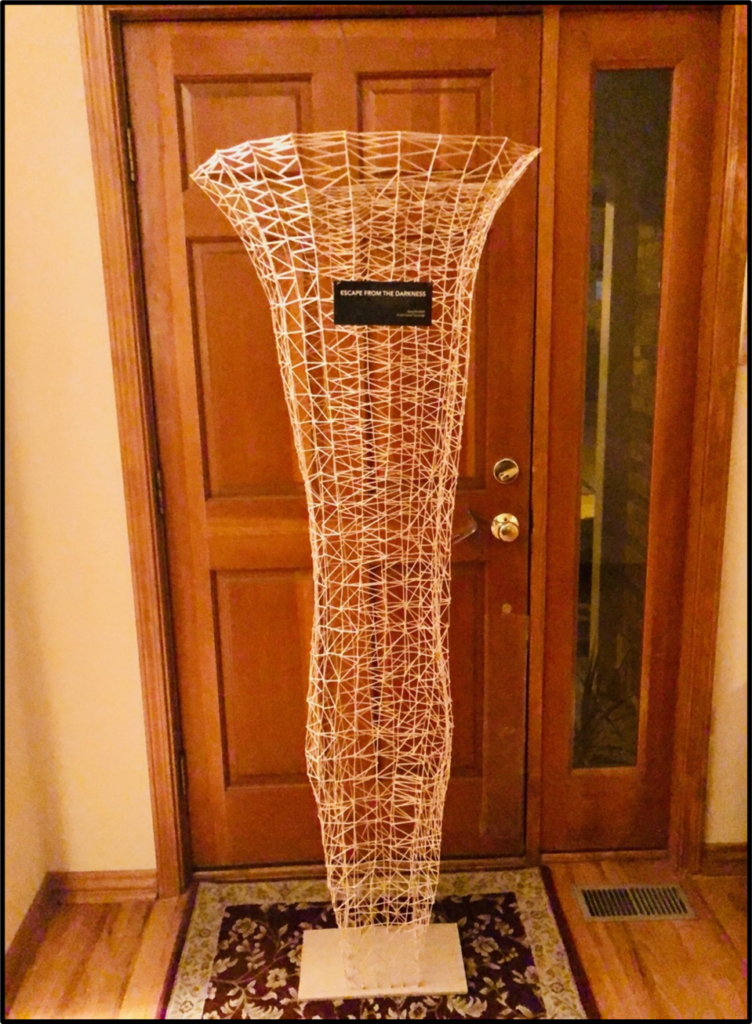
Career federal law enforcement officer discusses his life-changing encounter with EMDR
*Please note, this story includes the topic of suicide and may be triggering for some readers.*
5,115 days
5,115 is a number that has great significance to me. 5,115 is the number of days between my first memory at the age of 3 and my 17th birthday. It’s also the approximate number of days during my childhood and adolescence that I suffered (non-sexually) at the hands of a bully who was older and stronger than me. Much worse than the physical pain, however, were his words. There are certain words no human – especially a child – should ever have to hear. Words like worthless, stupid, idiot, weakling and loser. Caustic words like these were vocalized to me during many of those 5,115 days.
The happiest day of my life
On most of those days, I dreamed of a time when my bully would be gone. When the profound feelings of sadness, powerlessness and helplessness that overloaded my young, developing brain would stop.
I was 17 when that day finally arrived. It was the happiest day of my life. For the first time since I was a toddler, I felt safe. For the first time, I felt like I was no longer drowning every day in a cesspool of paranoia, unmitigated fear and sometimes excruciating pain. For many years, I thought that when the bully was out of my life, my nightmare would finally be over. Unfortunately – for me – it was just beginning.
College
Several months later, I departed for college in another city. The semester started out great, however quickly went downhill. I didn’t understand why, but I began experiencing increasing bouts of anxiety and was having difficulty sleeping – primarily because of horrific nightmares.
On the last day before Christmas break, I had a final exam in chemistry. For the first time in the semester, however, I came across a question that I had absolutely no clue how to answer. Today, over 40 years later, I still remember the precise feelings and sensations I had at that moment. When I came to question #4, feelings of incompetence, helplessness and sheer terror flooded my brain like a torrential downpour. My mind froze, and in spite of my best efforts, I wasn’t able to answer any more questions.
After the exam, many of my classmates went back to the dorm to celebrate. I returned to the dorm, immediately cleaned out my room and drove back to my parents’ home. For the next several weeks, I rarely moved, ate or drank. I wasn’t able to sleep much, but when I did, often awoke to find my body trembling uncontrollably, covered in sweat, and my mind filled with overwhelming dread because of blood-curdling night terrors. My soul became so engulfed with extreme sadness and hopelessness that I started to think that I was losing my mind. After only one semester, I withdrew from college, giving up my life-long dream to become a veterinarian.
And for the next 40+ years, I suffered. Some years, the darkness was relatively light. Other years, I spent 18-24 hours a day in bed immobilized by unfathomable sadness, paranoia and dread.
My law enforcement years
During year 10 in my 40+ year battle against depression, I became a special agent, and for the next nearly 25 years, had the privilege of serving as a federal law enforcement officer – primarily investigating complex narcotics/money laundering organizations in conjunction with the Department of Justice’s OCDETF (Organized Crime and Drug Enforcement Task Forces) Division.
Throughout the course of my career, a few of my closest colleagues were functioning alcoholics. Nearly everyone was aware of their struggle because we occasionally observed their behavior at off-duty gatherings. Nevertheless, in spite of their illness, they were incredible cops/investigators – some of the best I worked with. I learned to trust them implicitly. They protected my back (and sometimes saved my life) as I did theirs.
However, unbeknownst to nearly everyone at my agency as well as in my close-knit law enforcement circle, I was a functioning melancholic – someone who suffered immensely from severe depression. Like my coworkers who were functioning alcoholics, most days I was able to rise above the darkness, and gained a reputation for being an astute, meticulous investigator – earning many local, national and even international honors which now fill a room inside my home.
Nonetheless, I kept my struggle with depression fiercely private. Why? Many law enforcement officers will tell you that their worst nightmare isn’t getting assaulted or shot in the line of duty. It’s having their badge and gun taken away (even if only for a short period of time) due to a “mental” or “psych” illness. The thought of having a report in my personnel file with the words “mental illness” written on it was a stigma that terrified me; and early on I determined that it was something I would avoid at any and all cost.
Most cops will tell you that their departments have volumes of paper, policies and programs touting how their departments “support” officers with “emotional challenges/difficulties.” Nonetheless, where I worked at the time, it was commonly believed that once the “mental illness” tag was attached to you – you could never shake it or the consequences which ensued (failure to be promoted, assignments to less than desirable duty, etc…). Because of this, I suffered in silence for nearly a quarter of a century
In spite of the threat of being censured because of my illness, I still quietly invested incalculable amounts of time and over $100,000 – attempting to rid my soul of this darkness. I spent hundreds and hundreds of hours in the offices of skilled, licensed counselors trying nearly every type of therapy and practice available – cognitive, behavioral, mindfulness, integrative, talk and many others.
Additionally, I perused medical solutions for my depression. Over the course of nearly four decades, physicians prescribed me over 15 different anti-depressant, anti-anxiety and sleeping medications. I had medical doctors apply electrical shocks to my brain. I once even traveled to receive treatment from world renowned anesthesiologists in a major city who specialized in the treatment of depression, during which time they surgically injected a medication that had been proven to relieve the malady into nerve groups (called ganglia) next to my spinal cord.
Some of the remedies helped to allay the sadness for months at a time. Other things I tried actually made it worse. But as I once told one of my counselors, “when your brain is on fire, you’ll try anything to extinguish the flames.” Unfortunately, no matter what I did and how hard I tried, the darkness always returned. And each time it did, it seemed as if my resistance to it diminished, and its severity grew more intense.
Surrender
As many feds do, I retired from law enforcement in my early 50’s. I truly believed that once the stressors of my career were in my rear-view mirror that my depression would finally be over, and I could start enjoying life. Much to my dismay, however, I soon discovered that this simply wasn’t true. The retirement of my badge and gun lessened but didn’t entirely quash my depression.
Several years after I retired, I experienced an enormous familial loss, after which my soul took a free-fall into darkness. I’d experienced a lifetime of major depression, but nothing ever this harsh. In the months which followed a number of additional personal tragedies ensued, most of which were tangential to my initial loss
On February 3, 2015, I finally succumbed to this hideous disease. The relentless emotional torment I’d endured nearly every day since I was 18 (36 years, 6 months, and 2 days – or 13,336 days), had finally accrued to unbearable levels, the weight of which I could no longer carry. On that morning, I waited until members of my family departed for work, then laid down on my bed and attempted to take my life.
Shortly before breathing my last breath, I was miraculously found. In a race against time, emergency room physicians put me into a medically induced coma and placed me on a ventilator. For the next several days, ICU doctors warned my wife that my condition was grave, and I had less than a 50-50 chance of survival.
Eventually, I was taken off the ventilator and slowly emerged from the coma. I’ll never forget the day I awakened enough to realize what I’d done. When I finally opened my eyes, I wasn’t horrified by my actions. I was horrified by the fact that I was still alive. I’d spent 13,336 days trying to rid myself of this cruel albatross – but had failed. My suicide was intended to be my final statement, wherein I bowed in surrender after a lifetime of incomprehensible mental angst which I had devoted herculean efforts to defeat, but in the end – could not
Breakthrough in a physician’s office
For the first several years following my suicide attempt, I continued to suffer from this unrelenting illness. I typically spent entire days and nights in bed under the inescapable grip of profound sadness and despondency. Furthermore, my depression was now compounded because of the incredible guilt I felt as someone who’d disgraced his family and friends by attempting to take his life.
Against all odds, I still sought a cure. On an occasion subsequent to my attempt, while asleep under anesthesia in a physician’s office, something happened which alerted my wife and me to the fact that there was one issue that I’d never attempted to deal with during the thousands of hours I’d spent trying to rid myself of this nemesis – the bullying I’d endured during my formative years as well as the trauma I experienced during my career. Initially, when confronted about dealing with things from my past, I vehemently resisted. I was raised in a home where blaming your problems on others or your past was viewed as cowardly and irresponsible. And in my professional life, those defendants who blamed others for their bad behavior were often viewed with skepticism.
Nearly all of the hundreds and hundreds of hours of counseling I’d sat through had been devoted to correcting current distorted thought patterns, mindfully living in the present and not dwelling on the past. The thought of digging up old memories and reawakening the trauma I’d gone through years earlier seemed both counterintuitive and irrational.
However, I was desperate, and so seriously ill – again – that ending my life was looking like the only viable option to escape from the darkness.
Hope through EMDR
For the first time since the onset of my illness decades before, I sought out and began seeing a seasoned professional who specialized in the treatment of prior trauma using EMDR (eye movement desensitization and reprocessing). And what I experienced in finally addressing those things from my past – head on – was painful, but not detrimental. Figuratively reopening some of the bloody, gangrenous wounds that were inflicted during my first six decades of life was grueling and intense but ended up being the genesis of a remarkable and long-lasting healing that remains to this day.
My therapist taught me that the wounds of trauma don’t just disappear when the screaming and condescension stop, the bruises fade, and the blood is washed away. They oftentimes seep deep into the soul, infecting the very core of who a person is and what they become.
For nearly four decades, I pursued nearly every psychological therapy as well as countless medical remedies attempting to douse the inferno. Still, it raged like never before. My therapist helped me to realize that the firestorm in my brain couldn’t be extinguished until I directly addressed what had ignited it in the first place – the trauma which I’d so desperately tried to forget, but unbeknownst to me, was still lingering and deep within my brain and serving as lighter fluid to incinerate my soul. She then brilliantly utilized EMDR to help me to readdress some of my most traumatic memories. Like an accomplished firefighting pilot, she helped me to navigate the complex labyrinth of my mind, dropping lifesaving fire-retardant over key incendiary areas which were fueling the flames.
During my career, I occasionally came across suspects/witnesses with traumatic brain injuries. Individuals who’d been shot or brutally assaulted to the point where the brain was severely damaged. Because of this, I’d come to believe that when it comes to the human brain, there can never be healing or reversal of impairment, only efforts to mitigate and lessen symptoms. My belief has now been modified. At least in my life, EMDR has proven beyond a reasonable doubt that the “permanent” damage trauma inflicted on my brain throughout my formative years as well as during my law enforcement career, can be reversed.
It has taken nearly three years, an extraordinary amount of skill and patience on my therapist’s behalf, and arduous efforts on my part – but I can confidently state that the out-of-control blaze that nearly ended my life is now permanently extinguished.
The memories are still there, but they’re no longer flammable. On occasion, a few embers fly up, but through the use of adaptive memories, their once deadly effects are now quickly quelled. EMDR has healed my mind – so much so – that during a recent session with my therapist I said, “EMDR has not only saved my life – but for the first time in over 60 years, I feel fully alive – able to truly enjoy life and handle its most difficult trials with calm and confidence.”
My nightmare is finally over.
Sculptures of healing
In 2021, as my EMDR therapy was nearing completion, I wanted to create something that would memorialize and regularly remind me of the enormous obstacles I’d once faced, as well as the healing that had transpired in my life. And hence, I very slowly and patiently constructed the sculptures below: “Escape From The Darkness” and “Strength.”
If you’re struggling today, it’s my earnest desire that my story and these sculptures will inspire you to hang on and continue fighting – even though I know you may not want to. May they quietly speak to your soul, and let you know that there is hope, there is help and there is healing.


Doug is a retired law enforcement officer who has struggled with depression for more than 40 years. Through EMDR therapy, he finally found the hope and healing he spent years seeking. Doug bravely shares his story in the hope that it will inspire others to keep fighting and that healing and recovery from trauma is possible. Thank you, Doug, for sharing your EMDR journey with us.